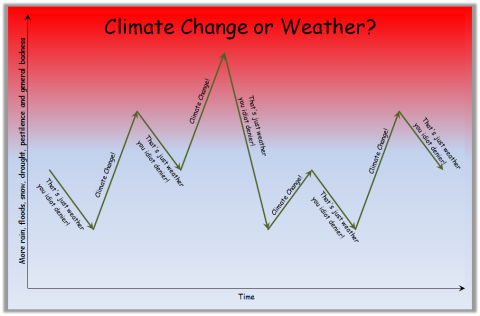At some point in the last decade or so, media organizations decided to make the weather report into an extension of the news, to (as I’m sure they’d have explained) provide a richer media experience for their audiences. This has degenerated into some pretty ridiculous weather-event related claims, as it seems every month for the last several years has been “the hottest evah!” if you got your news from the TV. Claiming something is the best/worst in history sounds very impressive, until you realize just how short a time we’re considering when we talk about the weather:
“This is the worst [weather event] in history!” You see it in all the headlines: “Hottest day in history!” “Worst hurricane in history!” “Coldest winter in history!” These headlines make me crazy and it’s not just because they’re being used to shill anthropogenic climate change fears nor is it because a lot of them are false. (For example, since 1924, there have been thirty-five Category Five hurricanes in our part of the Atlantic, most in September. Dorian was just the latest, not the most exceptional.)
No, what really irks me is that phrase “in history” or its companion phrase “ever” (“Worst heat wave ever!”) What the dopes in the media miss, or perhaps willfully ignore, is the fact that we have barely any weather history. Instead, we’ve only been measuring weather data since the second half of the 19th century. I learned this when I read Simon Winchester’s delightful Krakatoa: The Day the World Exploded: August 27, 1883. In it, he notes that the volcano’s explosion was the loudest sound ever recorded — and that it was recorded only because the Victorians had an obsession with record keeping.
Before the Victorians came along, there were always people who kept records, but once the Victorians came along it became a “thing.” For the first time in human history, people had (a) instruments that could measure things with a fair degree of accuracy and that were affordable, and (b) the literacy and leisure time to note and record these things.
Thus, in the late 19th century, owning a reliable thermometer, checking the weather daily, and taking the time to write it down was something entirely new. Before that, there were no reliable thermometers and only the richest could afford such unreliable tools as existed for measuring temperatures. The fact that people were no longer living at subsistence level and were literate enabled them to find the time and have the skills to record data.
That’s why we know how loud Krakatoa was: All over the world, as the sound waves reverberated around the earth, over and over, busy Victorians were looking at their reliable time-pieces (the first affordable, mass-produced watches were driven by railway needs and came onto the market in the late 19th century) and noting down the time at which they heard that strange loud noise.
All of which means that our reliable weather data isn’t about “history” or “ever,” but is, instead, about 150 years old, at most. Everything else is guess work, based upon random reminiscences and best guesses using things such as Arctic core samples or tree rings.




